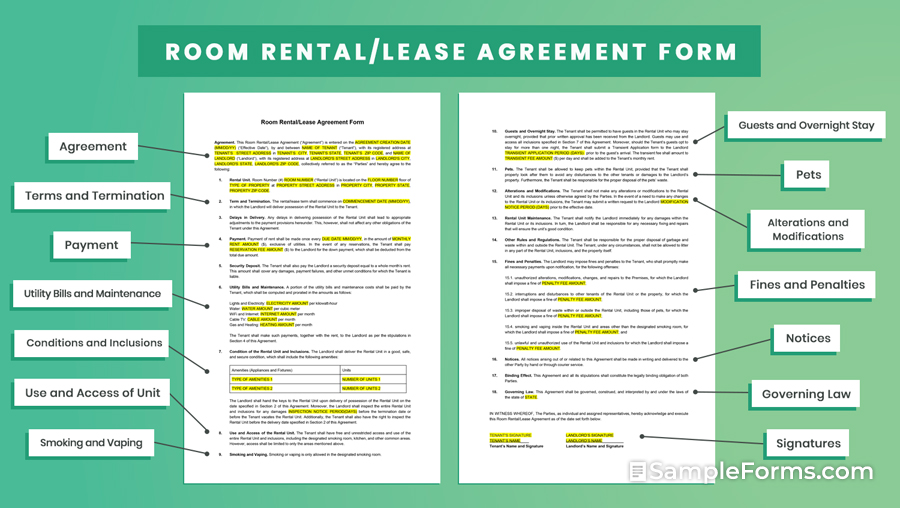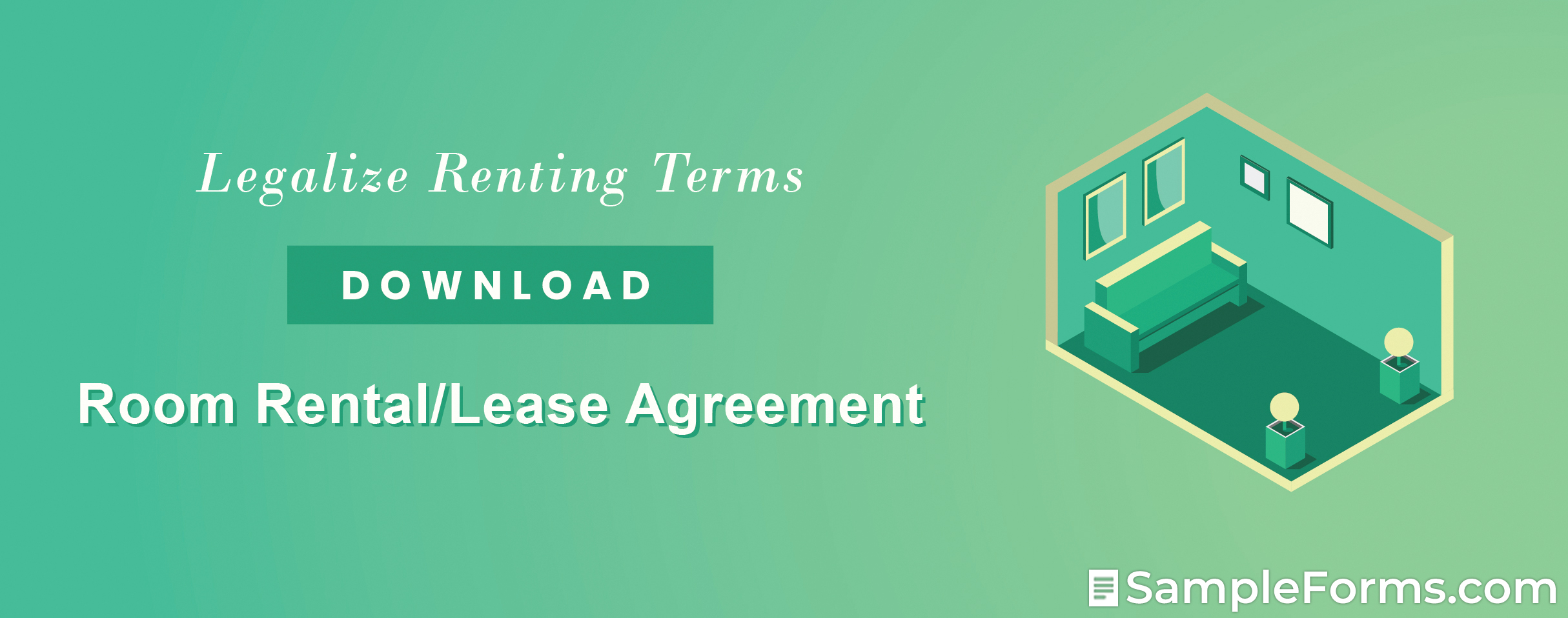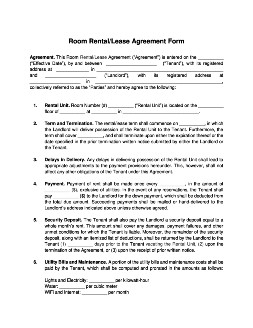- Eviction Notice Forms
- Power of Attorney Forms Forms
- Bill of Sale (Purchase Agreement) Forms
- Lease Agreement Forms
- Rental Application Forms
- Living Will Forms Forms
- Recommendation Letters Forms
- Resignation Letters Forms
- Release of Liability Agreement Forms
- Promissory Note Forms
- LLC Operating Agreement Forms
- Deed of Sale Forms
- Consent Form Forms
- Support Affidavit Forms
- Paternity Affidavit Forms
- Marital Affidavit Forms
- Financial Affidavit Forms
- Residential Affidavit Forms
- Affidavit of Identity Forms
- Affidavit of Title Forms
- Employment Affidavit Forms
- Affidavit of Loss Forms
- Gift Affidavit Forms
- Small Estate Affidavit Forms
- Service Affidavit Forms
- Heirship Affidavit Forms
- Survivorship Affidavit Forms
- Desistance Affidavit Forms
- Discrepancy Affidavit Forms
- Career Assessment - 16+ Examples, Format, Tips, Pdf Forms
- Undertaking Affidavit Forms
- General Affidavit Forms
- Affidavit of Death Forms
Room Rental/Lease Agreement
Renting a room is a budget-friendly alternative, especially for those who are looking for a place to stay. Apart from that, renting a spare room in your house or apartment is one way of putting an extra buck in your pocket. For tenants and landlords to have a harmonious relationship, it can only be achieved by drafting a room rental/ lease agreement beforehand. Read More
Room Rental/Lease Agreement
- What is a Room Rental/Lease Agreement?
- How to Write a Room Rental/Lease Agreement
- Frequently Asked Questions
- Why do we need to write a room rental/lease agreement?
- Do we need to notarize a room rental/lease agreement?
- On what reasons can we terminate a room rental/lease agreement?
- What is the first thing we should do before entering into a room rental/lease agreement?
- What if the tenant doesn’t sign the room rental/lease agreement?
What is a Room Rental/Lease Agreement?

A room rental/lease agreement is a document that outlines the terms and conditions of a lease. Its terms and conditions will often include rental/lease’s term period, expiry date, rental fees, payment option, the lease’s do’s and don’ts, as well as the parties of the lease. And more importantly, a room rental/lease agreement sets the limitations of both parties while protecting their respective rights at the same time.
How to Write a Room Rental/Lease Agreement
According to nmhc.org, 36 % of American households are leased by their owners. And the numbers continue to rise as many people jump from one city to another to work or study. Property owners lease a spare room in their houses for extra income. And if you’re leasing one for the same reason, here are the step on how to write a room rental/lease agreement.
1. Check Your State’s Tenancy Laws
A room rental/lease agreement is a document that outlines the terms and conditions of the parties of a room lease. These terms and conditions are governed by state tenancy laws to ensure that leases are fair and transparent. So make sure to check your state’s tenancy laws before you proceed on writing a room rental/lease agreement.
2. Specify the Parties of The Lease
The agreeing parties are the most important element in every agreement, as they indicate the persons bound by its provisions. The parties of a room rental/lease are the landlord and tenant. Specify who the parties are by writing their names and addresses. Aside from that, make sure that you’ve checked the tenant’s background before signing a room rental/lease agreement with them.
3. Set the Lease Term Period
The lease term indicates the period that covers the lease; its duration and expiry. It also sets the conditions for the lease’s termination and renewal as well. lease terms can either be a monthly or yearly lease. And be sure to indicate the lease’s commencement and expiry dates, as well as the conditions of its termination and renewal, when writing your room rental/lease agreement.
4. Lay Down The Lease’s Do’s and Don’ts
Another important element of a room rental/lease agreement is its rules and regulations. This outlines the rights and obligations of the parties, as well as its limitations as well. This is also where the landlord imposes his authority over the leased property. In laying the rules and regulations, make sure that it is following your state’s tenancy laws.
5. Sign and Finalize the Lease Agreement
Like most agreements, a room/rental lease agreement is not enforceable and effective unless both parties sign on it. Their signatures signify their acknowledgement and acceptance of the agreement’s terms and conditions. Make sure to always include a space for both you and the tenant to sign on when writing a room rental/lease agreement.
Frequently Asked Questions
Why do we need to write a room rental/lease agreement?
Writing and executing a room rental/lease agreement can benefit you in many ways, as a landlord. This document seals and finalizes the terms and conditions of the lease, as well as sets the boundaries for the tenant’s use of the leased property. This document also shows the tenant’s acceptance of the agreement’s provisions and can be used as proof should legal disputes arise.
Do we need to notarize a room rental/lease agreement?
Notarizing a room rental/lease agreement depends if your state requires it or not. However, you may notarize your room rental/lease agreement even if your state does not require it. You can also do so should you feel the need to add a layer of protection to the leased property. Aside from that, a notarized room rental/lease agreement can greatly help you in case disputes escalate into legal troubles.
On what reasons can we terminate a room rental/lease agreement?
There are many reasons to terminate a room rental/lease agreement. First, is when the tenant defaults in paying the rent. Second, if the tenant uses the property for anything illegal. Third, if the tenant expresses so in writing. And lastly, if the tenant violates or breaks the lease.
What is the first thing we should do before entering into a room rental/lease agreement?
Conducting a background check of the tenant should be the first thing to do before entering into an agreement with them. This allows you to know the tenant’s rent history and capacity to pay, thus enabling you to determine whether to strike an agreement with them. You can do this by submitting their rental application forms to tenant screening companies and credit bureaus, or by asking the references mentioned in their rental/lease application.
What if the tenant doesn’t sign the room rental/lease agreement?
The room rental/lease agreement automatically becomes unenforceable and void if the tenant doesn’t sign it. This means that the cancellation of the lease before it starts. Signatures indicate the parties’ acceptance of the room rental/lease agreement’s provisions. It also signifies the finality and enforceability of the agreement, as well.
While renting a room may sound like a good idea of putting extra cash in your pocket, such is not without its risks. Renting a room to a total stranger is unhealthy for your business. Thus, it’s always better to protect yourself and property from those. One of the ways of doing it is by conducting a background check beforehand. And to add another layer of protection, you must write and execute a room rental/lease agreement.

